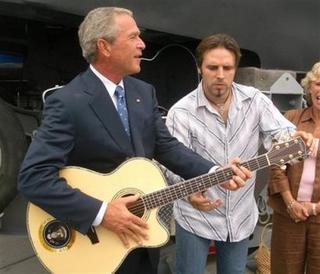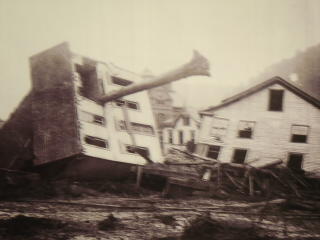WHAT I LEARNED FROM THE JOHNSTOWN FLOOD


.
(top) August 30, 2005, Pres. Bush returns to the scene of his "Mission Accomplished" banner in San Diego while hundreds of thousands in Mississippi and southern Louisiana were desperately waiting for help from the National Guard and FEMA
(bottom) Johnstown, Pa. in 1889, after the South Fork dam burst and a wall of water crushed the city
"I bet Alabama, Mississippi and Louisiana are missing their National Guardsmen right now."
"Where are Louisiana's National Guard troops when their neighbors really need them? Mostly in Iraq, of course, defending the homeland."
"Bring home the National Guard."
"Let's have a vote on where we want to spend billions of U.S. taxpayer money in relief, Baghdad or the Gulf Coast of our own country"
Anonymous vents, the Atlanta Constitution after Katrina.
*****
If you want to know a human being’s character, see what he or she does after a natural disaster. At the same time that looters walked the streets of New Orleans, people all over America were lining up at Red Cross centers to donate blood and cash. And more were organizing relief efforts to send food, water, and clothing to the victims.
Albany’s Flood of 1994
Albanians are well aware of what it is like to live in the wake of a natural disaster that upends all things normal. In 1994, the Flint River overran its banks by miles, cutting Albany in half for weeks as all bridges south of Lake Blackshear were closed. We had a curfew, coffins floating out of the riverside cemetery, National Guard troops at checkpoints, and for the chosen few, helicopter rides to travel 100 yards across the Flint. Most of Albany State University was under water.
As the waters rose, many of us joined together to sandbag important resources, including the County Public Health Department and Palmyra Hospital. Albany High’s gymnasium was one of the shelters for those driven out of their homes by rising floodwaters, and numerous good hearted citizens drove down there to drop off food, clothing, pampers, drinks, and other necessities. Putting the official stamp of government recognition to the magnitude of our disaster, Governor Zell Miller visited, and President Clinton flew over to view the damage.
The Johnstown Flood of 1889 and the Red Cross
Now take all of that and multiply it by 10,000, and you have a glimmer as to what the country is facing in Mississippi and Louisiana right now, and for months to come. But the truly incredible thing about human beings is that we will prevail. Without a doubt. I grew up in a community which had been nearly destroyed by the (then) greatest natural disaster in our nation’s history. When the South Fork earthen dam gave way miles upstream from Johnstown, Pennsylvania, in 1889, it unleashed a tidal wave that coursed down the narrow valley and smashed the city, killing thousands and leaving rubble in its wake.
The American Red Cross cut its baby teeth on the relief efforts in 19th century Johnstown, an effort that was repeated 88 years later when another devastating flood hit- this one caused by a freak torrential rainfall over the hills surrounding the City (similar to Tropical Storm Albert that inundated areas upriver of Albany in 1994). In 2005, Red Cross workers are still the lynchpin of private relief efforts to areas devastated by a natural disaster.
We respond to disasters better than we prevent them
As wonderful as we can be to our brethren after disasters strike, it’s sad that too often it takes a disaster to get us to do what we should have done in the first place. People build homes and schools downstream from unsafe dams (the Kelly Barnes Dam Flood of November 6, 1977, near Toccoa, Georgia, killed 39 near Christian and Missionary Alliance College), live too close to active volcanoes ( Mt. St. Helen's, Washington, May 18, 1980, 57 deaths), or cram expensive vacation homes check by jowl on the beaches in areas regularly hit by hurricanes (hello, Florida and South Carolina!). When (not if) the huge earthquake strikes the portions of California where millions live, Kristina may be relegated to a footnote in history.
But as unfortunate as it is when individuals’ thoughtless lifestyle decisions cause needless deaths, it is unforgivable when deliberate political decisions are made that leave citizens at risk and exacerbate the loss of life. The Bush Administration bears direct responsibility for the lack of a prompt response by a sufficient number of armed National Guard troops needed to restore order. Two days after Katrina hit, the Emergency Services Chief of Jefferson Parish told CNN’s Aaron Brown that the community of half a million was unsafe because urgently needed Louisiana Guard troops were in Iraq.
Other Bush Administration policies have left the nation at risk. Long term, it has consistently opposed efforts to reduce global warming. Scientists have reported that the Gulf of Mexico is two degrees warmer than usual, providing the fuel Katrina used to regroup from the Category 1 hurricane that struck Florida to the Category 5 hurricane it became off the coast of Louisiana and Mississippi. (Hurricanes start in the warm waters of the South Atlantic, and the season doesn’t start until mid year when the ocean water temperature rises sufficiently).
Bush cut Army Corps of Engineer funds to maintain the Louisiana levees
The people of New Orleans and Jefferson Parish have more reason to be bitter: the budget cuts caused by the War in Iraq and tax cuts led to the door slamming on funds the Army Corps of Engineers had budgeted to maintain and improve levees in Louisiana.
Former Clinton staffer Sidney Blumenthal reported in Spiegel online that:
“In 2001, FEMA warned that a hurricane striking New Orleans was one of the three most likely disasters in the U.S. But the Bush administration cut New Orleans flood control funding by 44 percent to pay for the Iraq war.”
“A year ago the U.S. Army Corps of Engineers proposed to study how New Orleans could be protected from a catastrophic hurricane, but the Bush administration ordered that the research not be undertaken.”
Will Bunch noted in Editor and Publisher that the New Orleans Times-Picayune had regularly run stories since Bush took office that the war in Iraq and tax cuts had shortchanged efforts to safeguard the City of New Orleans:
“When flooding from a massive rainstorm in May 1995 killed six people, Congress authorized the Southeast Louisiana Urban Flood Control Project, or SELA.
Over the next 10 years, the Army Corps of Engineers, tasked with carrying out SELA, spent $430 million on shoring up levees and building pumping stations, with $50 million in local aid. But at least $250 million in crucial projects remained, even as hurricane activity in the Atlantic Basin increased dramatically and the levees surrounding New Orleans continued to subside.
Yet after 2003, the flow of federal dollars toward SELA dropped to a trickle. The [U.S. Army Corps of Engineers] never tried to hide the fact that the spending pressures of the war in Iraq, as well as homeland security -- coming at the same time as federal tax cuts -- was the reason for the strain.
On June 8, 2004, Walter Maestri, emergency management chief for Jefferson Parish, Louisiana; told the Times-Picayune: "It appears that the money has been moved in the president's budget to handle homeland security and the war in Iraq, and I suppose that's the price we pay. Nobody locally is happy that the levees can't be finished, and we are doing everything we can to make the case that this is a security issue for us."”
We the People prefer tax cuts to disaster prevention
However, if we want to know where the blame squarely lays- it is with us, with “We the People.” Like Pavlov whose dogs salivated when the bell rang, we drool all over those politicians who will tell us what we want to hear- even when there is no dog biscuit awaiting us. No matter what disaster has befallen this nation, no matter how urgent the need, any candidate for public office who won’t sign up for the crack cocaine of the political world- namely, tax cuts- will go the way of Walter Mondale. When the former Vice President was foolish enough to tell voters we would have to raise taxes to pay for essential government programs, he was done in by a 1984 Reagan landslide, winning only his home state of Minnesota. Voters preferred the Reagan promise of supply side economics- tax cuts that would miraculously generate more tax revenues.
The promised balanced budget never arrived for America under Reagan, nor under his successor, George H. W. Bush. Instead, the country suffered through ever increasing massive deficits made worse by the billions spent on Savings and Loan bailouts. It’s only been 20 years, but before there was Enron and Worldcom, the nation was rocked by failures of S&L’s made possible by Reagan’s decision to remove the safeguards that protected investors.
Our government is now run by men who want to “drown it in a bathtub”
It’s said that we get the government we deserve, so one can only conclude that we are destined for a warm seat in Hell for entrusting the reins of power to America’s self proclaimed “conservatives” (motto: no wilderness is too pristine to strip mine or drill) who have been Pied Pipered by Bush guru Grover Nordquist. Nordquist famously opined that he wants to reduce America’s government by cutting taxes until what’s left is small enough to fit in a bathtub- where he can drown it! I wonder how many of those conservatives who live in Gov. Haley Barbour’s Mississippi (Barbour is a former National Republican Committee chairman who was a strong advocate of tax cuts) are going to turn down federal tax dollars in the form of help from FEMA and the National Guard because government is the "problem, not the solution?"
Can we learn our lesson?
The lesson of Johnstown is that sometimes an ounce of prevention is worth a thousand pounds of cure. After my home town endured a second, less serious flood in 1936, caused by overflow from the two rivers which meet in the valley, the Army Corps of Engineers built retaining walls to contain the rivers. We were lucky- no Grover Nordquist was around in those days to try to drown the federal government in a bathtub.
Unfortunately for residents of New Orleans in 2005, because the Bush Administration refused to spend $250 million dollars to avert or reduce the damage from a predicted catastrophe, President Bush has already had to ask Congress for over $10 billion to clean up the disaster- and that’s just a down payment. Not too surprising from an administration that has spent $200 billion to rebuild and safeguard an Iraq which it destroyed in an unnecessary invasion.
Over 250 years ago, Ben Franklin counseled against being "penny wise and pound foolish." What Ben didn’t know was that no American politician can get elected in the age of television and talk radio unless he is just plain foolish.


1 Comments:
Jim, I am impressed with this essay. You connected so much, and so succintly. Must have taken many hours. I will read it again, as well as other of your blogs. Am forwarding it to some folks, including my son, Clay, who has left D. C. to help with the refugees. Joy and my sister Mariellen and her family have been helping a particular family of 26 people who are staying at the Suburban Motel, who were fortunate enough to get this far.
Warm regards, Ray Johnson
Post a Comment
<< Home